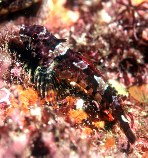| Family: |
Tripterygiidae (Triplefin blennies), subfamily: Tripterygiinae |
| Max. size: |
6 cm TL (male/unsexed) |
| Environment: |
demersal; marine; depth range 0 - 12 m |
| Distribution: |
Southwest Pacific: endemic to New Zealand. |
| Diagnosis: |
Dorsal spines (total): 18-21; Dorsal soft rays (total): 9-11; Anal spines: 0-0; Anal soft rays: 20-22. Head and body red to reddish brown with pinkish blotches and prominent dark columns and arches running onto belly. Fins of various hues of pink and red. Distinguished from other triplefins by the distinctive color pattern and the continuous lateral line extending to the caudal peduncle. |
| Biology: |
Adults inhabit rock pools and in surge zones, especially in exposed areas. Usually on steep slopes or sides of boulders encrusted with invertebrates and algae (Ref. 13227). Eggs are hemispherical and covered with numerous sticky threads that anchor them in the algae on the nesting sites (Ref. 240). Larvae are planktonic which occur primarily in shallow, nearshore waters (Ref. 94114). |
| IUCN Red List Status: |
Least Concern (LC); Date assessed: 04 May 2010 Ref. (130435)
|
| Threat to humans: |
harmless |
Source and more info: www.fishbase.org. For personal, classroom, and other internal use only. Not for publication.

